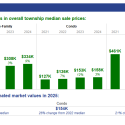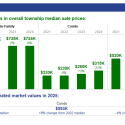Chicago Homeowners See Tax Burden Increase After Appeals Conclude
Tuesday, May 20, 2025
Many Chicago homeowners could see their property taxes increase this year, as residential property took on a greater share of the city's tax burden after appeals for the 2024 reassessment cycle were finalized at the Cook County Board of Review.
When the Cook County Assessor’s Office completed its triennial reassessment of Chicago in 2024, total assessed value increased $9.1 billion.
Because the total value of non-residential and commercial property in Chicago increased slightly more than residential value, homeowners saw their share of assessed value decrease from 51% to 49%. This could have reduced homeowners’ share of the property tax burden.
However, the Assessor’s Office is not the final word on a property’s taxable value. The Cook County Board of Review, a separate office within the property tax system, has the final authority to alter assessments appealed to their office before tax bills are calculated.
This year, the Board of Review cut commercial property values in Chicago by 17%, or $4.3 billion in assessed value. By contrast, the Board of Review only decreased residential property values by 1%, or $0.4 billion.
More detailed data on these changes is available at the Data Dashboards on the Assessor’s Office website or https://www.cookcountyassessor.com/dashboard and https://www.cookcountyassessor.com/data-dashboard-municipalities.
These commercial cuts by the Board of Review meant that homeowners saw their share of assessed value – which correlates with the overall property tax burden – jump to 54% from 49% under the CCAO’s assessments.
For the Class 5A properties that make up the majority of commercial property in Chicago – such as office buildings, retail stores, and hotels – total assessed value at the end of the 2024 reassessment and appeals cycle was $14.3 billion. This was lower than the $14.4 billion value of these properties when the reassessment cycle began.
While the Assessor’s Office increased the value of Class 5A property by 21% initially, the Board of Review reduced values for properties in this class that appealed their assessments by more than $3 billion.
This burden-shifting is not new. During the last Chicago reassessment in 2021, residential properties made up 53% of citywide assessed value after appeals to the Board of Review were finalized, in large part due to $6.2 billion in cuts for commercial properties on appeal.
In the intervening years, reassessments in the suburbs of Cook County have also seen the tax burden shift onto homeowners. A recent study from the Cook County Treasurer’s Office showed that homeowners in Cook County saw nearly $2 billion added to tax bills over a period of 3 years after “businesses found particular success appealing to the Board of Review.”
By the Numbers: Board of Review appeal shifts
Chicago’s total assessed value, a proxy for its tax base, could have grown 22%, or $9 billion, under the CCAO’s values. After the Board of Review’s appeals were finalized, the tax base instead increased by 11%, or $4.4 billion.
The largest reductions from the Board of Review for commercial properties, both by percentage and Assessed Value, came in the three townships that cover Chicago’s downtown: North Chicago, South Chicago, and West Chicago.
BOARD OF REVIEW APPEAL CHANGES BY TOWNSHIP | ||
Chicago Township | Assessed Value Change | Percentage change |
South Chicago | -$1.6 billion | -21% |
North Chicago | -$1.1 billion | -19% |
West Chicago | -$0.8 billion | -15% |
Lake View | -$0.3 billion | -14% |
Lake | -$0.2 billion | -13% |
Jefferson | -$0.2 billion | -13% |
Hyde Park | -$0.2 billion | -13% |
Rogers Park | -$0.1 billion | -14% |
The major property classes with the largest percentage reductions were Class 5B Industrial (22% reduction) and Class 5A Commercial (17% reduction). The major property classes with the largest assessed value reductions were Class 5A commercial ($3.0 billion reduction) and Class 3 Large Multi-Family ($0.6 billion reduction).
BOARD OF REVIEW APPEAL CHANGES BY MAJOR PROPERTY CLASS | ||
Major Property Class | Assessed Value change | Percentage change |
Class 1 (Vacant) | -$0.01 billion | -4% |
Class 2 (Residential) | -$0.35 billion | -1% |
Class 3 (Large Multi-Family) | -$0.63 billion | -13% |
Class 5A (Commercial) | -$3.01 billion | -17% |
Class 5B (Industrial) | -$0.52 billion | -22% |
Residential values set by the Assessor’s Office decreased by 1% in all townships except Lake View and West Chicago, where they decreased by 2%.
Residential properties made up 51% of the city’s share of assessed value before the 2024 reassessment. This increased to 54% after the Board of Review’s appeals were finalized.
Protecting homeowners from tax spikes
There is currently no mechanism in place to protect Cook County homeowners who experience significant property tax increases.
According to recent data released by the CCAO, 240,000 households in Cook County have recently seen their tax bills spike by 25% or more in a single year.
This includes many parts of Chicago. In the 35th Ward, for instance, nearly 2,700 households paid almost $8 million more in property taxes due to these spikes in their tax bills.
The Cook County Assessor’s Office has worked on state legislation to create a property tax relief initiative for homeowners. This “circuit breaker” program would provide relief to qualifying homeowners with a 25% bill spike. Credits given to homeowners would cover up to half of the tax bill increase.
The Circuit Breaker Property Tax Relief Act was filed in the Illinois Senate as SB1978 by Sen. Patrick Joyce (D-40th) and in the House as HB3808 by Rep. Justin Slaughter (D-27).




